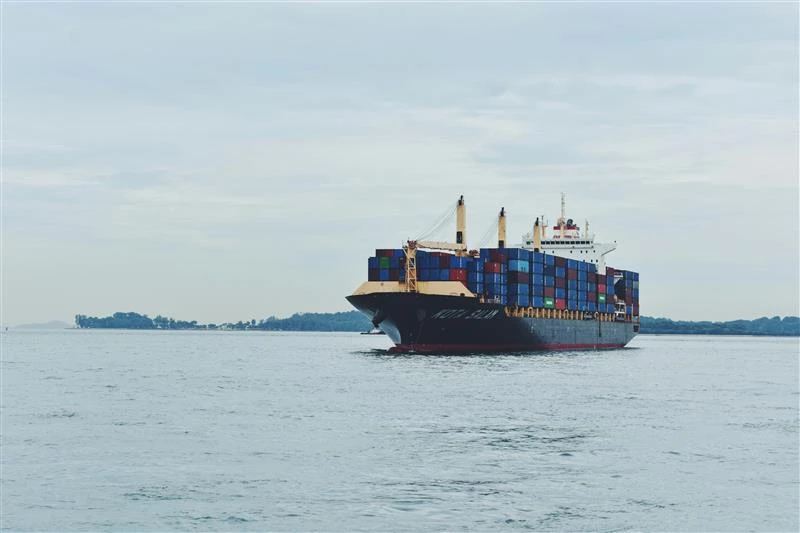In line with the trend of rapid technological advancement, many countries within Asia have begun to develop smart cities – a process which refers to cities’ integration of Internet of Things (IoT) devices or information and communications technology (ICT) for overall improvement in terms of efficiency, cost, quality, etc. One such country which has proactively advocated for this type of development is Indonesia. As early as 2013, Indonesia piloted a Smart City program. In 2017, the government officially launched the “Movement Towards 100 Smart Cities,” an initiative that aims to fully develop 100 Indonesian smart cities by 2045. While this venture is largely for the benefit of Indonesian citizens, it also presents equally beneficial opportunities for businesses situated within the country.
To understand further how the development of smart cities are benefitting citizens and businesses alike, read this excerpt from our latest white paper, Can Indonesia Achieve ‘100 Smart Cities’ by 2045?, which you can read and access in full here. 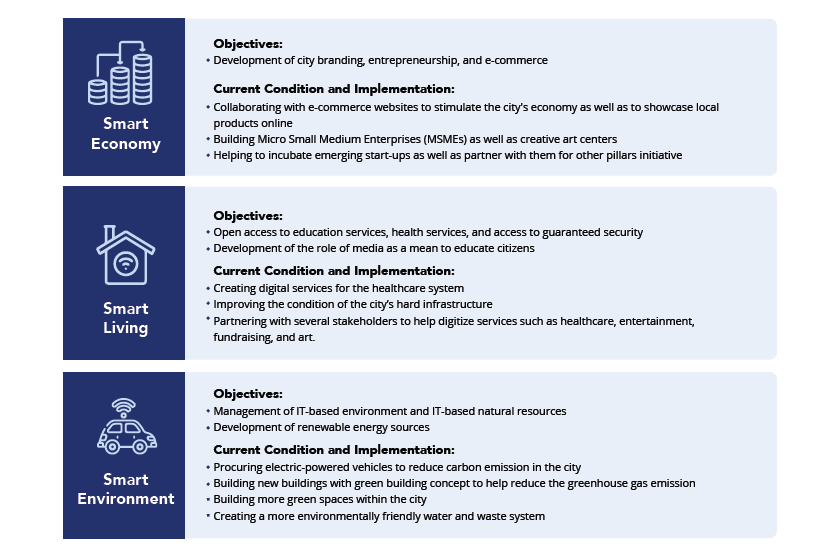
Ideal Collaboration in Smart Cities
When attempting to fully utilize the potential that smart cities can bring about, collaboration in must be the foremost priority among involved parties. Multifaceted collaboration in several regards, namely, the following has been essential in Indonesia implementation:
- Infrastructure: To properly incorporate the technology which a smart city entails (such as AI sensors, increased network connectivity like 5G, energy monitors, etc.), it is necessary to establish a strong foundation for hard and soft infrastructure wherein collaboration is key. By ensuring that several parties collaborate, both governmental and private, future issues like disparity of infrastructure availability among populace can also be prevented. Within the mission of collaborative infrastructure, business opportunities can manifest for several parties, such as contractors, telecommunications companies, urban planners, etc.
- Information: When attempting to implement strategies within smart cities, collaborators must be able to access data that can provide and guide their plans. By prioritizing the access to such information, smart cities will be able to strategize in a realistic fashion that is informed by actionable data. Focusing on informed collaboration will allow the entry of consultancy firms, industry experts, and marketing firms to name a few.
- Implementation: Finally, collaboration is vital to the implementation of smart cities, especially when considering that all parties should act in line with the smart city master plan decided upon. Collaborated implementation also signifies that the involved partners are working in unison towards the same goals, which is important within the framework of a smart city’s six pillars: smart governance, smart living, smart economy, smart mobility, smart environment, and smart people/society. Both technological and non-technological businesses are provided potential opportunities. For example, IT consultancies, start-ups, and media firms will all be essential in ensuring a well-balanced smart city transformation.
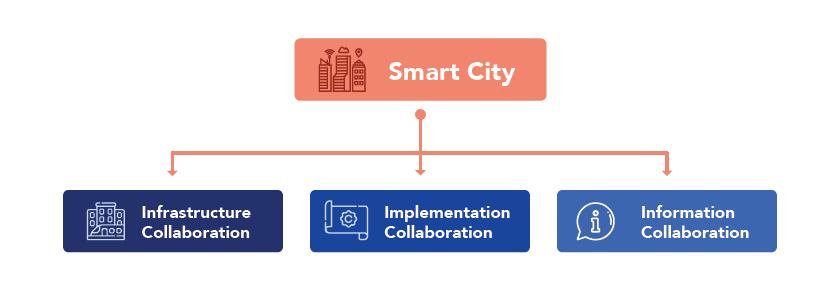
Role of Technological Advancement
Synonymous with the term ‘connective cities,’ smart cities naturally entail a substantial dependence on technology and related digital solutions to improve a city’s overall well-being. Further, by relying on technological advancement, smart cities will also be able to tackle problems relating to urbanization.
The adoption of technology for smart cities are predicted to generate significant impact in three primary methods, specifically, integrated sensors, security and public safety, and data collection and IoT. The implementation of digital solution in these areas may result in these advantages:
- Integrated Sensors: Although difficult to manage and retrofit to traditional city operations, the use of integrated sensors could potentially be seen in processes such as automatic-adaptive light sensors, smart parking, air quality and temperature sensors, etc.
- Security and Public Safety: Digitalization of a city’s security system and public safety processes will be seen in online ticketing, emergency report systems, fire/flood/natural disaster detection, etc. At the heart of these changes, a smart city’s transformation will rely on national police with related bodies (building owners, traffic officers, etc.) acting as support.
- Data Collection and IoT: Technological advancement in this regard focuses primarily on the automated gathering of data and subsequent translation to predictive analytics, which then results in data-driven changes and decisions. Application of data collection and IoT will help in monitoring energy consumption (water/electricity usage), waste management, and real-time traffic information among others.
Placing an emphasis on the role of technological advancement in the development of smart cities will create an influx of activity from foreign and domestic enterprises who are keen to capitalize on the promising business opportunities. More importantly, the public’s day-to-day living and quality of life will improve drastically both in the present and future. 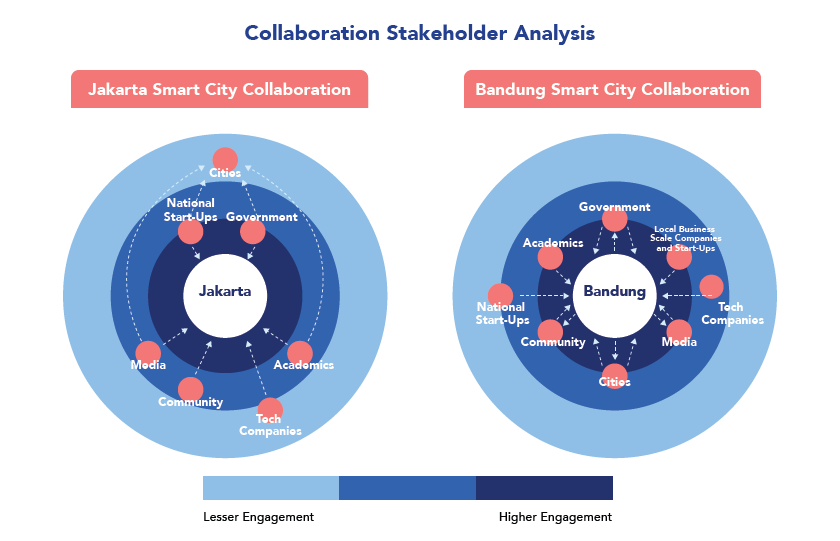
Drivers and Barriers for Smart City Development
To sustain the mission of developing smart cities, Indonesia have identified several primary areas that will drive growth. Indonesia will look to leverage its technology engaged population and high volume of start-ups, while further bolstering efforts through national to municipal government initiatives.
As it stands, Indonesia’s emerging economy currently has 2,209 start-ups operating within the country, and by 2024 the Indonesia Ministry of Research Technology is forecasting a total of 4,500. Moreover, the Indonesian government is planning to invest heavily in infrastructure wherein a budget of approximately 400 billion USD will be spent across several projects. Examples of national to municipal governmental expenditure and support can already be seen in initiatives such as the Strategic National Project (SNP), and West Java’s provincial government adoption of the smart cities developmental plan.
While these figures are promising indicators that Indonesia is well on its way to achieving the goals set forth in the “Movement Towards 100 Smart Cities” initiative, the country is proceeding cautiously as there are still barriers to development. Specifically, in terms of governmental planning, issues such as surface level regulation for smart city plans and inadequate social coordination (e.g., educating the public on practical and direct benefits) must be addressed. In addition, close attention should also be paid to execution, especially in maintaining sustainable implementation and addressing possible data security concerns amid transitions toward smart cities. 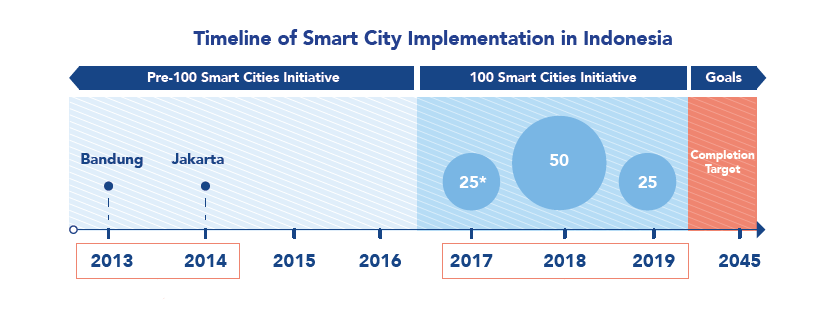
Building on Successful Smart City Development
Indonesia will hope to replicate and use the successful transitions of Jakarta and Bandung toward smart cities as a blueprint. As Indonesia’s capital city, smart city development in Jakarta has manifested in several ways. For example, the city has created a mobile application named JAKI wherein citizens can freely access public information and service. Other initiatives include the installation of CCTVs and traffic lights with ACTS capability across main roads, integration of e-commerce and unicorn startups to boost Smart Economy, and the creation of Jakarta Smart City, a body dedicated to ensuring successful implementation of the smart city.
In Bandung, smart cities technology can be seen in the creation of a command center which monitors major city operations, or even in the improvement of public infrastructure via the implementation of smart parking and a bike-sharing system. Projects aimed at empowering citizens have also been initiated as evidenced by the construction of a creative hub and MSMEs (Micro, Small and Medium Enterprise) center.
Moving forward, as Indonesia continues to push for the development of smart cities throughout the country, business opportunities across a variety of markets and sectors will arise. As the goal of successfully transitioning concerns the government, citizens, and private enterprises, these business opportunities will be widely available to many. In the coming years, it is precisely this collaborative effort among stakeholders which will determine the success of smart city development in Indonesia.





